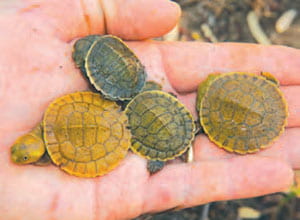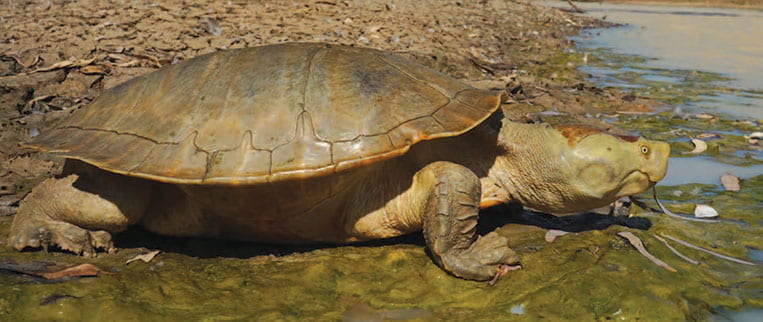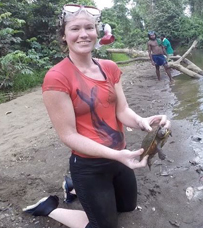Finding solutions to mitigate threats to wildlife and help maintain ecosystem function are at the heart of UNE’s Laboratory of Applied Zoology and Ecological Restoration (LAZER)
— Dr Debbie Bower, School of Environmental and Rural Science
The COVID-19 pandemic has consumed every aspect of our economy and health in early 2020 as we react to this emerging global threat. In such times of physical isolation and economic strain, the need for security of crucial resources like food and water in all communities has become amplified. Yet the damage from recent drought and bushfires is fresh in our communities. Science is critical to find solutions to the constant challenge of balancing needs for our natural resources, agriculture and society. Only with evidence-based innovation will we create the resilience that Earth needs to overcome disasters in the future.
Freshwater rivers and wetlands have a high diversity of unique species that help maintain water quality and ecological condition. River regulation and water extraction threaten these services. Finding solutions to mitigate threats to wildlife and help maintain ecosystem function are at the heart of UNE’s Laboratory of Applied Zoology and Ecological Restoration (LAZER). Dr Debbie Bower is leading a team of postdoctoral researcher and postgraduate students in the Laboratory, using experimental and empirical ecology to better understand the impacts of environmental change on rivers and wetlands. Without integrated solutions to development and food production, the environment and many species that we love will be lost forever.
Riverine wetlands

Cooper Creek Turtle hatchlings. Photo by Donald McKnight.
Reduction in rainfall and extraction of water has changed important events like the frequency and extent of riverine flows. From the boom and bust flow regime of Cooper Creek to the highly regulated Gwydir River, the laboratory is exploring the impact of flow on wildlife like freshwater turtles and frogs. The Cooper Creek is a wild river home to a single species of freshwater turtle. Postdoctoral researcher Donald McKnight has been recapturing turtles that were originally marked 20 years ago by collaborator Arthur Georges at the University of Canberra. This research is aiming to uncover how aquatic species, like turtles, tolerate periods without flow, and quantify the cost and benefit of floods and drought. Knowledge of how turtles influence the food web and respond to changing river conditions helps predict the effect of climate change and river regulation in the future.
The drought has also featured heavily in recent research, with extreme evaporation causing unprecedented rates of drying in many wetlands. Masters’ students Annette Deppe and Razzaq Sarker have been measuring the responses of floodplain wildlife during the drought. Their research has employed radio-telemetry to compare the behavioural response of different turtle species to drying water holes. As part of a collaboration with Commonwealth Environmental Water Office and the NSW state government, the Laboratory has also accessed monitoring data of frogs on the Gwydir floodplain to determine how environmental flows affect breeding of frogs over a larger time scale. Tracking animals allows us to identify important habitats on the floodplain and long-term monitoring enables government agencies to better prioritise where to conserve water in the landscape to support existing populations of native wildlife.
Upland lagoons
The New England Tablelands are home to unique type of wetlands called upland lagoons. These wetlands occur as depressions that are often either wet or dry, and they are listed as an endangered ecological community. Nearly all of these lagoons occur on private properties which means that community education and support from landowners is crucial to their conservation. The Laboratory has teamed up with Dr Manu Saunders and Dr John Hunter with funding by the NSW Environmental Trust, to undertake a seven year project. Together, the team is monitoring lagoon quality with different land use histories to learn best management practices. The Project is also undertaking an educational and outreach campaign about the importance of the wetlands. By identifying the benefits to the community in looking after these unique resources the team hopes to secure their persistence in the landscape into the future.
Farm Dams
Much of the Laboratory’s research focuses on finding management solutions that have dual benefits for wildlife conservation and our communities. Dr Bower is researching local farm dams to determine how different grazing practices can advantage farmers and wildlife alike. Simple practices like fencing and providing troughs can reduce the impact of cattle on small water bodies. Management of small water bodies has received comparatively less attention than our large dams and rivers but with over 2 million farm dams in Australia, improving their condition can have big consequences for conservation. The Project is drawing on the strength of the University of New England’s SMART farm’s ability to manipulate stock pressure and thereby compare management practices. The Project is supported by a recent Discovery Early Career Research Award from the Australian Research Council.
Aquatic ecology has also been bringing science to life for students from all backgrounds and places. High school students from Thalgarrah Education Centre put on waders to sample water quality and invertebrates in Lake Zot on UNE’s Armidale Campus. At Far Out Science, school students from the New England Tablelands come to practice their scientific illustration of mayflies to beetle larvae. Seeing these environments up close and practicing research methods to study aquatic systems cements the conceptual background that we give the students in class. Our students venture each year to the Bellinger River to examine the swamp to the sea in the Environmental Science degree. Then in their final year of study, students have the option to travel to Bhutan in Overseas Study to complete lecturer-led and independent projects predicting the impact of hydropower and land use changes on glacier fed rivers in the Himalayas. These experiences create unique up-close interactions that instil an unshakeable passion in our students.
[Banner image and photo by Donald McKnight]



